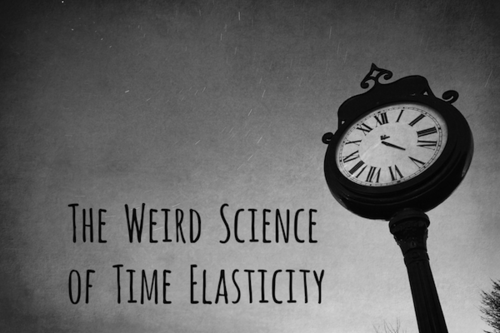
Is time speeding up, or is it just me?
“
Wow! This year has gone by so quickly!”
You’ve heard it dozens of times. Maybe you’ve said this, or something similar such as “It seems as if I get busier every year,” or “There’s just not enough time in the day!”
Why is it that as we get older, either we slow down or time literally speeds up?

When we were children, the summer stretched ahead endlessly. We had plenty of time and never felt rushed. Now it’s as if we blink and it’s gone! It’s weird.
As this year winds to a close and we begin thinking about our plans for next year, we decided to check into what seems to be a universal phenomenon and we found some pretty interesting insights that we thought we’d share with you.
There are two major schools of thought on the topic. One puts it all down to the psychological effect of aging, while the other says that time really is speeding up and that this is a scientifically proven fact.
It’s not quite as kooky as it sounds. Einstein calculated that the faster we go, the slower time goes and conversely the slower we go, the faster time goes. When an object’s speed increases toward the speed of light, time moves more slowly. For instance, if we were to be in a space craft moving at the speed of light for just a few days, then returned to earth, we’d find that in our absence, decades had passed.
When it comes to explaining just how time is speeding up for us here on earth, we look to something called
‘Schuman Resonance’ which is a measurement of the resonance, or frequency, of the earth. Without going into too much scientific explanation, all matter has a frequency, or an electro magnetic “pulse.” Schuman Resonance measures that of earth. When this resonance was first measured in the 1950’s, the earth’s frequency was 7.8 hertz. Apparently recently it has been recorded at 12 hertz. This means that a 24 hour day now feels as if it’s just 16 hours.
 If the scientific theory for time speeding up sounds a bit too strange, there’s the other theory tied to how we perceive time as we age.
If the scientific theory for time speeding up sounds a bit too strange, there’s the other theory tied to how we perceive time as we age.
That theory explains how time perception is relative to the length of our lives and to the number of recurring milestones. In other words, when you are doing things for the first time and when you are younger, that experience becomes a big milestone and forms a significant percentage of your life to date.
As you age, your life, of course, becomes longer. Therefore the percentage of your life taken up by an experience becomes smaller. When you do things routinely, you also form a perception that they take less time. For instance, your first Christmases as a child seemed like they took forever to arrive, whereas now, they feel as if they arrive the day after Thanksgiving! Ana Swanson who wrote about this phenomena in the Washington Post puts it like this:
“It means that waiting 24 days for Christmas at age 5 literally feels like waiting a year at age 54.”
To illustrate that point, here’s an interactive perspective on time by Austrian Maximillian Kiener that illustrates how this works
http://www.maximiliankiener.com/digitalprojects/time/
 However, this explanation doesn’t really feel as if it tells the whole story.
However, this explanation doesn’t really feel as if it tells the whole story.
For instance, there have been experiments (you could replicate this yourself if you like) where a twenty year old and a seventy year old were each asked to estimate when a minute had passed. Neither had any means of measuring the time other than what they thought. The twenty year old estimated a minute reasonably accurately, while the seventy year old thought it was over faster than it actually was.
In the 1960’s psychologists Wallace and Green studied this phenomena. They asked younger people to describe time. The younger people used “static” metaphors such as “the time is quiet” and “time is like a motionless ocean” whereas older people used metaphors such as “time is like a speeding train.”
In 2005, Marc Wittman and Sandra Lehnhoff of Maximilian University in Munich also studied this phenomena. They found a surprising twist. It seems that time “speeds” up as people aged towards 50. People between 20 and 50 felt most pressured by lack of time, specifically not having enough time to do all that they needed to do within a day. Across this entire age span, all felt that time was speeding up.
Interestingly, people between the ages of 50 and 95, did not perceive that time continued to increase in speed. This could very well correspond to the fact that between the ages of 20 and 50 we are most under pressure from our jobs and personal responsibilities causing us to feel “time pressure,” whereas after 50 many people begin to take things a little easier. The other surprising insight coming from the study was that when people of all ages were asked to assess the passage of time retrospectively, they all felt that time was speeding up.
 People talk about their biological clocks and sometimes use this as an explanation for the phenomena, but in reality, this “clock” only measures circadian rhythm, it doesn’t measure the passing of time at all. Some scientists feel that the perception of time passing is linked to the levels of dopamine in the brain.
People talk about their biological clocks and sometimes use this as an explanation for the phenomena, but in reality, this “clock” only measures circadian rhythm, it doesn’t measure the passing of time at all. Some scientists feel that the perception of time passing is linked to the levels of dopamine in the brain.
Although we all feel that time is speeding up with each year that passes, it turns out that it’s not all time, but only specific measurements.
Apparently, there is a difference in how fast we feel hours and days go by as opposed to how fast we feel that years go by. Hours and days may seem to go by at a relatively normal speed, or even slowly, depending upon what we’re doing. However as we age, we feel as if the years are flying by faster and faster. Having said that, you’ve probably noticed that when you’re really busy, the hours and days do seem to go by faster than normal.
Claudia Hammond, in a BBC article, says that we assess time in two different ways. We gauge time prospectively and retrospectively. In other words, we look at time right now and assess how quickly it’s passing by at this moment, and we also look back and assess how fast yesterday or last week went by.
In many instances the resultant perceptions are quite similar. But, as we age, the recurring milestones in our lives accumulate. As we look back over these milestones, they seem to arrive more and more quickly. Birthdays are a prime example. “Am I really 50 already? What happened, I was only 25 a few years ago?!”
The psychologists say that this is because as we age there are far fewer “new” experiences in our lives and a lot more “old” experiences. Life becomes a series of recurring milestones with little to differentiate them from their previous occurrences. One birthday seems much like the next and often we can’t remember specifics of a past birthday at all.
The million dollar question for those of us who’d like to slow things down a little is: can we? Is there any way that we can slow the passage of time as we age? Or are we doomed to slide down a slippery slope of “where did the time go” until finally there’s no time left? How awful that sounds!
Psychologists say that there is something you can do if you want to alter your perception of the passage of time.
If you want time to go slower, you need to actively seek new experiences. Savoring new experiences gives you more memories, different memories to those you’ve made before. This means that when you look back you see a time period filled with all these new milestones and your memory is filled with a multitude of details different to anything you’ve experienced before. That, they say, will make it seem as if that period in time went much slower than normal.
Well, we’re not quite sure whether to agree with that advice or not. As the saying goes, “Time flies when you’re having fun,” so conversely, if it’s dragging, chances are you are not enjoying those new experiences all that much!
Whatever your perception of time might be, we want to encourage you to slow down during this holiday season and take time to spend with family and friends, doing the kinds of things you’ll remember for the rest of your life. One thing we can all agree upon is that once time is gone, we can’t bring it back. So use it wisely and live life to the full!
You can discover more very interesting time related information in this BBC series by physicist Michio Kaku at this link: https://www.youtube.com/watch?v=MTx6ha6fRwo&list=PL03F2D49431E2A889
More reading on this topic:
http://blogs.scientificamerican.com/mind-guest-blog/why-does-time-fly-as-we-get-older/
http://www.bbc.com/future/story/20120709-does-life-speed-up-as-you-age
http://ubiquity.acm.org/article.cfm?id=1455706
https://www.washingtonpost.com/news/wonk/wp/2015/07/23/haunting-images-show-why-time-really-does-seem-to-go-faster-as-you-get-older/
https://www.psychologytoday.com/blog/cutting-edge-leadership/201004/why-time-goes-faster-you-get-older
http://blog.idonethis.com/science-of-slowing-down-time/
http://www.thetruthseeker.co.uk/?p=30314
http://ubpost.mongolnews.mn/?p=1514
http://www.dailymail.co.uk/sciencetech/article-3325763/Can-t-believe-s-Christmas-Technology-SPEEDING-perception-time-claims-study.html
Thanks to: http://www.cofcogroup.com








 Sat Mar 23, 2024 11:33 pm by globalturbo
Sat Mar 23, 2024 11:33 pm by globalturbo
 When we were children, the summer stretched ahead endlessly. We had plenty of time and never felt rushed. Now it’s as if we blink and it’s gone! It’s weird.
When we were children, the summer stretched ahead endlessly. We had plenty of time and never felt rushed. Now it’s as if we blink and it’s gone! It’s weird. If the scientific theory for time speeding up sounds a bit too strange, there’s the other theory tied to how we perceive time as we age.
If the scientific theory for time speeding up sounds a bit too strange, there’s the other theory tied to how we perceive time as we age. However, this explanation doesn’t really feel as if it tells the whole story.
However, this explanation doesn’t really feel as if it tells the whole story.  People talk about their biological clocks and sometimes use this as an explanation for the phenomena, but in reality, this “clock” only measures circadian rhythm, it doesn’t measure the passing of time at all. Some scientists feel that the perception of time passing is linked to the levels of dopamine in the brain.
People talk about their biological clocks and sometimes use this as an explanation for the phenomena, but in reality, this “clock” only measures circadian rhythm, it doesn’t measure the passing of time at all. Some scientists feel that the perception of time passing is linked to the levels of dopamine in the brain.
 False
False 




